When Pakistanis make up their mind to work for the betterment of society then there is no limit to what we can achieve. This is not just a patriotic statement that I came up with. Examples of such benevolence and welfare projects are all around us. As part of our ‘Inspiration Pakistan’ series today we will introduce a project where a group of dedicated people have built a whole new Welfare City in rural Sindh. With facilities spread over approximately 100 acres, this complex is called Rashidabad.
Rashidabad is located near Tando Allahyar in Sindh. Tando Allahyar itself is located between Hyderabad (37 km) and Mirpur Khas (32 km).
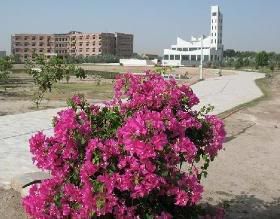 Rashidabad is a multi dimensional welfare project. It includes several schools, hospitals, housing and recreational facilities for the orphans and under-privileged of our society. It works on the true principles of Pakistaniat and serves the humanity irrespective of race, religion and ethnic background.
Rashidabad is a multi dimensional welfare project. It includes several schools, hospitals, housing and recreational facilities for the orphans and under-privileged of our society. It works on the true principles of Pakistaniat and serves the humanity irrespective of race, religion and ethnic background.
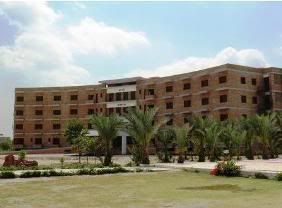 The quality services provided at Rashidabad are usually free of cost for the needy. The monthly expenses of the project are funded from the charity money and donations made by individuals, families and charitable institutions in Pakistan.
The quality services provided at Rashidabad are usually free of cost for the needy. The monthly expenses of the project are funded from the charity money and donations made by individuals, families and charitable institutions in Pakistan.
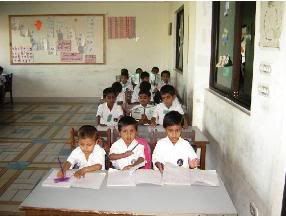 The project is a brain child of 1965 and 1971 war veteran, Air Commodore (Retd) Shabbir A. Khan. It is named after Flight Lieutenant Rashid A Khan, a student of PAF College Sargodha, who laid down his life for the nation. Work on the project started in December 13, 1998. At present the project is being run by Rashid Memorial Welfare Organization (RMWO).
The project is a brain child of 1965 and 1971 war veteran, Air Commodore (Retd) Shabbir A. Khan. It is named after Flight Lieutenant Rashid A Khan, a student of PAF College Sargodha, who laid down his life for the nation. Work on the project started in December 13, 1998. At present the project is being run by Rashid Memorial Welfare Organization (RMWO).
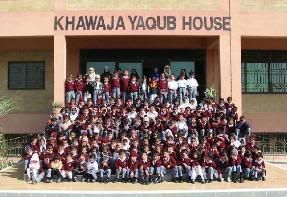 RMWO is also running several other welfare projects in collaboration with Government and Non-Governmental Organizations (NGO)s. To give some examples of this partnership, the Citizens Foundation (TCF), an NGO has a school inside Rashidabad. Another NGO called Mustafa Benevolent Trust (MBT) has been involved in the construction and maintenance of the orphanage as well as the main water purification plant in Rashidabad.
RMWO is also running several other welfare projects in collaboration with Government and Non-Governmental Organizations (NGO)s. To give some examples of this partnership, the Citizens Foundation (TCF), an NGO has a school inside Rashidabad. Another NGO called Mustafa Benevolent Trust (MBT) has been involved in the construction and maintenance of the orphanage as well as the main water purification plant in Rashidabad.
Schools in Rashidabad:
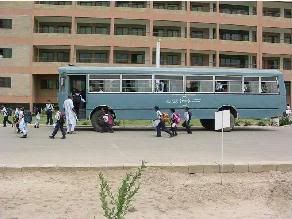 Rashidabad complex already has three schools built and functioning. These include the Yaqub Khawaja (YK) Academy, The Citizens Foundation (TCF) School and the Sargodhian Spirit Trust (SST) Public School. Collectively, these schools now have an enrollment of 1200 students.
Rashidabad complex already has three schools built and functioning. These include the Yaqub Khawaja (YK) Academy, The Citizens Foundation (TCF) School and the Sargodhian Spirit Trust (SST) Public School. Collectively, these schools now have an enrollment of 1200 students.
The SST Public School has a strength of around 400 students with twenty percent of them studying free. Similarly the YK Academy has twenty five percent students who study free. The TCF High School has a monthly fee of only Rs. 100 and provides books and uniforms also within it. Poor students pay only Rs. 25 with the same privileges. Such students constitute over 35 percent of this school’s enrollment.
The Orphanage at Rashidabad:
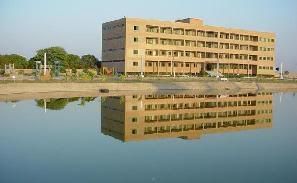 The orphanage is named Amzi home after the Donors Abdullah Mustafa and Zainab Ishaq from Bahrain. It is a five-storey building that can accommodate nearly 288 people, including 32 senior citizens. The building has been completed at a cost of more than $1 million.
The orphanage is named Amzi home after the Donors Abdullah Mustafa and Zainab Ishaq from Bahrain. It is a five-storey building that can accommodate nearly 288 people, including 32 senior citizens. The building has been completed at a cost of more than $1 million.
Elevators run on all floors. This eases the mobility for the senior citizens. Each room at the Amzi home can accommodate up to 12 children.
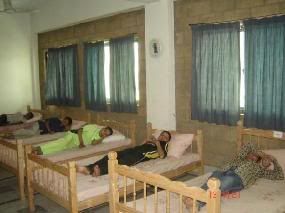 The orphans (presently 86) who are at Rashidabad come from all over the country and belong to different cultures and backgrounds. Mr. Iqbal Samad Khan, the Chief Volunteer of Rashidabad project proudly calls it ‘Our Mini Pakistan.’
The orphans (presently 86) who are at Rashidabad come from all over the country and belong to different cultures and backgrounds. Mr. Iqbal Samad Khan, the Chief Volunteer of Rashidabad project proudly calls it ‘Our Mini Pakistan.’
Foster mothers are also on staff at the orphanage to provide best attention to kids as young as few years old. At present the youngest pupil is from a village in Dadu and is only 3 and a half year old. Rashidabad Complex also provided host facilities to the orphans of Kashmir Earthquake of 2005.
Main Hospital at Rashidabad
 The main hospital of Rahidabad is run by Shehnaz A. Ghani Trust for the day to day operation and maintenance. The hospital plans to include state-of-the-art medical facilities. Two complete floors of the Hospital are planned to be handed over to the SIUT of Karachi to work as its satellite for Rural Sindh.
The main hospital of Rahidabad is run by Shehnaz A. Ghani Trust for the day to day operation and maintenance. The hospital plans to include state-of-the-art medical facilities. Two complete floors of the Hospital are planned to be handed over to the SIUT of Karachi to work as its satellite for Rural Sindh.
Eye Hospital at Rashidabad
With active assistance and participation from Layton Rahimtoola Benevolent Trust (LRBT) an eye hospital has also been set up at Rashidabad. It was inaugurated on June 28, 2008. The eye hospital has a capacity of giving medical treatment to about 300 patients a day. An average of 50 operations are conducted from Monday through Friday. All this is being done mostly free of cost to the needy patients.
Other School Projects Around Rashidabad area:
In addition to three schools witihn Rashidabad, RMWO also runs twenty Non Formal Schools within a 20 kilometer radius around Rashidabad.
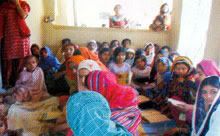 These schools function for two hours a day in remote areas with an average of 25 students. They are taught the Jugnoo Course here which enables the students (grand mothers, mothers, girls and boys) to learn basic Urdu and Maths – much more than the definition of literacy in Pakistan.
These schools function for two hours a day in remote areas with an average of 25 students. They are taught the Jugnoo Course here which enables the students (grand mothers, mothers, girls and boys) to learn basic Urdu and Maths – much more than the definition of literacy in Pakistan.
Railway Station at Rashidabad
Rashidabad Welfare City has its own Railway Station. Seen in the photo below is a train from Karachi approaching Rashidabad Station
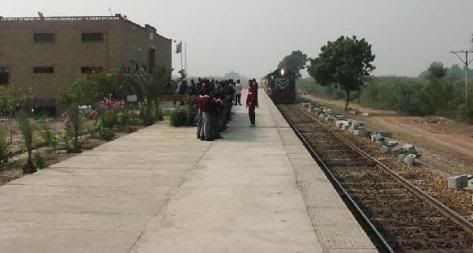
Why this Post?
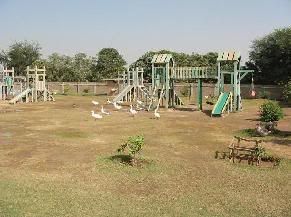 I have personally not visited Rashidabad project yet but I’ve been closely following its development for the past few years. I also know first hand the commitment of its volunteers and how much dedicated they are to make this an exemplary welfare project. This is the reason that we have chosen to feature this Project on the pages of Pakistaniat. It makes us proud.
I have personally not visited Rashidabad project yet but I’ve been closely following its development for the past few years. I also know first hand the commitment of its volunteers and how much dedicated they are to make this an exemplary welfare project. This is the reason that we have chosen to feature this Project on the pages of Pakistaniat. It makes us proud.
References and Credits:
1. Mr Iqbal Samad Khan, ex GM Pakistan Railway and Chief Volunteer at Rashidabad.
2. Rashid Memorial Welfare Organization
3. Rashidabad at Pakistan Economist
3. Rashidabad – Begining Charity at Home by Mehroz Sadruddin
4. Rashid-abad by Unaiza Naseem
5. SST Public School at Rashidabad
6. The Citizens Foundation
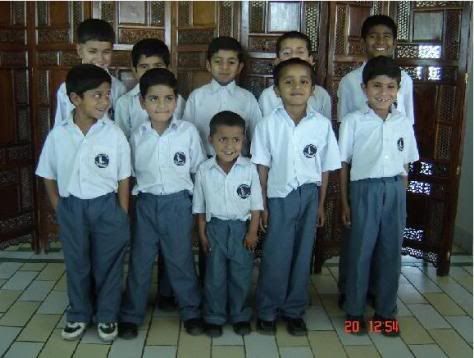



















































Tina,
What I am saying is very simple: No government, no matter how wealthy, powerful and efficient, can succeed without active participation of its citizens in improving society.
That’s why, in countries such as the US, they teach and encourage public service, volunteerism and charity as a civic responsibility of every citizen. To incentivize positive behavior, students are asked to volunteer in the community and those who do get extra credit, and colleges consider such service in their admissions decisions.
Corporations are also encouraged to be good corporate citizens of the communities they operate in by offering their employees’ time and their money for promoting education, literacy, health care, good nutrition etc etc.
So regardless of what the government does or does not do, each of us needs to light candles rather than curse darkness. If enough of us start doing it, we can make a huge difference in the lives of those who have the least.
I invite you to read more at:
http://www.riazhaq.com/2008/09/light-candle-dont-c urse-darkness-in.html
Hi Riaz,
I’m not sure what you’re trying to defend here– are you trying to say that Pakistan’s military dictatorships and deeply corrupt/inept civilian leadership is better than what real democracies have to offer?
I don’t think you are.
Are you trying to say that the efforts of private citizens on a small scale basis can replace having a functional, representative government and civil infrastructure?
I hope not, because that’s just not true.
Are you trying to say that every little bit is honorable and helps?
Okay, that’s fine, but it still leaves us where we were before.
Tina,
I don’t think you understand how important it is for people to actively participate in improving society in any nation, particularly in a democracy. No government, no matter how wealthy and caring and powerful, can deal with all of the social ills alone.
Participation by private citizens and foundations is not a sign of weakness but a sign of strength of the society. The more people do it, the better it is. Just voting and selecting the rulers by free and fair elections is only the beginning. And then the real job of governance begins. It requires active participation of the people at all levels who understand their rights and obligations of being citizens of a democratic society.
Here are a couple of quotes from Alexis de Tocqueville’s book “Democracy in America”:
“The health of a democratic society may be measured by the quality of functions performed by private citizens.”
“Americans of all ages, all stations of life and all types of disposition are forever forming associations. There are not only commercial and industrial associations in which all take part, but others of a thousand types-religious, moral, serious, futile, very general and very limited, immensely large and very minute.”
If democracy were a magic wand and a panacea, we would see a real “Shining”example of it next door, where the feudal system ended a long time ago. The reality, as we all know it, is quite the opposite. Democracy in India has failed to solve even the basic issues of widespread hunger and poverty. The main reason is the lack of interest and participation of the people as active citizens of a democracy.
I see strong arguments below. Regardless of the doubts about the intentions of these acts, the acts in themselves are good and as such should be appreciated. I guess the question is that just because there are no land and tax reforms in the country, the rich are getting richer and poor are getting poorer, and that the Victorian era culture is thriving, should a Rashidabad not be built. This is without emphasizing that the people involved in this specific project hardly come from the elite of the country. I fully understand how bad the bigger picture is in Pakistan but zooming into a street corner should an orphanage not get donations just because the system at large is unjust and rotting. Yes there are uses of poverty but to put every good deed under such umbrella may not be fair.
Hi Cyma,
As a psychologist, you probably studied (or should have) a text called “The Uses of Poverty”. If you haven’t, you might find it interesting.
These stories are like the ones about American soldiers in Iraq rescuing a cute puppy and taking it to a beautiful new life while killing a few hundred Iraqis each day and condemning the others to die on the streets from hunger and thirst. Oh, it feels good to hear about the puppy, doesn’t it? What curmudgeon would criticize such a story?
All over the world, but especially in deeply unequal societies (like Victorian England), the upper crust starting up charities to honor their martyred flyboys or other personalities from their own class is a well-known phenom, it’s been studied, and the motives are not really altruistic.
In the slave owning plantation era South, every nice young lady of breeding knitted her baby booties for the poor drudges who mopped her floors, and every gentlemen contributed to the orphan’s fund. It was expected. It was also part and parcel of what made the whole system work.
It’s a little Dickensian, but nonetheless true–once you’ve made your pile, there’s not much left to do except use a bit of it to make sure everybody else thinks you and your family members are saints. This consolidates your claim to exceptionalism and entitlement, hence it hinders, not helps, progress towards societal equality.
I’d like to see posts coming from a greater variety of viewpoints–how about some posts written by people other than the well-to-do expat population? Or people who live in the Pakistan known to the majority of the population, people who live outside the Western-educated urban industrialist bubble?
When do we hear these voices? If they were heard, what would they say?
Would they say that educating 86 orphans while millions others rot on the street is the most beautiful thing in the world, and really the best the rich and powerful in the country can do?
I think they might say something different, and I think also you might not like to hear it.
All of the trouble currently brewing in Pakistan with “the mullahs” is, in reality, the poor of Pakistan speaking. Because the mullahs are at least talking to the poor and promising them something. The Saudi sponsored mullahs are lying, of course, and just using these poor people–but the mullahs are the only ones speaking to them. So what do you expect?
The wahabi mullahs in Pakistan are going to continue to grow in power until the top 2% in the country start to have that same conversation with the poor, and not through charitable projects and tiny NGOs but real structural and political change.
The change is going to come–it’s just a question of who will be in power and how much bloodshed there will be.
There are individual people in Pakistan who control more money than the country itself does. The poor are speaking, and they are not listening. They think the walls around their estates are high enough.
I wouldn’t count on it.
Rashidabads will not fix the country. I can understand why Adil posts about them–they’re a feel-good drop in an ocean of otherwise bad news–but I don’t think even he is saying that this is a serious solution to Pakistan’s poverty problems. What is?
Pakistaniat, can we have posts coming from some different quarters on this question?
I mean really, you have a poster who thinks in all honesty that 40 million “middle class” (meaning not very rich themselves) people can fix the less-than-a-dollar-a-day poverty of 140 million other people? Even if this middle class gave all their money away, that math doesn’t work.
Since this problem is being currently replicated in a number of places around the globe, I think a real discussion would be very interesting and refreshing.
Any thoughts?